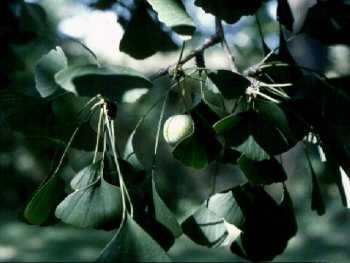|
Gardens Ablaze |
||
|
|
Medicinal
Uses of Ginkgo |
|
|
Additional Ginkgo Information
Growing Ginkgo Site Map
Home |
Fresh Ginkgo leaves can be dried and used in teas or made into capsules if you are lucky enough to have a Ginkgo tree close at hand, or you can buy standardized Ginkgo online or at a health food store. Ginkgo is one of the only herbs that has been reliably standardized, so you know exactly what you are getting. See the links below for instructions on making teas and capsules. Controlled studies have revealed that Ginkgo does improve cognitive functioning due to improved blood flow in arteries and capillaries. It is often taken by older people as a sort of energizer to improve mood, alertness, memory, and attention span. It appears to protect veins and arteries and preserve their tone and elasticity. It is therefore used for problems associated with atherosclerosis, dementia, Alzheimer's disease, Raynaud's Syndrome, peripheral vascular disease, peripheral neuropathy, and associated poor circulation, including tingling, pain, and numbness in the extremities. This same improved blood flow characteristic also appears to have some impact on macular degeneration, with documented improvement in the vision of some patients, and symptoms of tinnitus and vertigo. Other less documented but likely benefits concern relief from hangovers, impotency in males, and sex drive in both males and females, making it something of an aphrodisiac. Other studies have revealed that Ginkgo has powerful antioxidant properties, thus making it a good choice for prevention and possibly reversal of stroke damage, cardiovascular problems and occlusive arterial disease, and that it has benefit in reducing the inflammation caused by asthma and allergies, and relieves symptoms associated with multiple sclerosis outbreaks. Lastly, Ginkgo has been extensively studied, and side effects are minimal, if any. In rare cases, reports of stomach upset and headache have occurred, usually due to overuse. A prudent strategy is to start with a low dose and work your way up, as with any herbal remedy. A usual dosage of prepared, standardized Ginkgo is 40 to 80 mg three times per day. If using tea, start with 2-3 cups per day and work your way up.
Custom Search
|
|
|
Gardens Ablaze |
||
 Worldwide,
Ginkgo is an extremely popular herb that millions use for better health.
It is sometimes called an anti-aging herb because it has been proven to
increase blood circulation to the entire body, especially the brain, increasing
mood, mental alertness, memory, and overall stamina, which are the very
functions that diminish as we age. Much study has been done on Ginkgo
and its effects, and indeed, it does appear to be about as close to a fountain
of youth as we are going to get anytime soon.
Worldwide,
Ginkgo is an extremely popular herb that millions use for better health.
It is sometimes called an anti-aging herb because it has been proven to
increase blood circulation to the entire body, especially the brain, increasing
mood, mental alertness, memory, and overall stamina, which are the very
functions that diminish as we age. Much study has been done on Ginkgo
and its effects, and indeed, it does appear to be about as close to a fountain
of youth as we are going to get anytime soon.